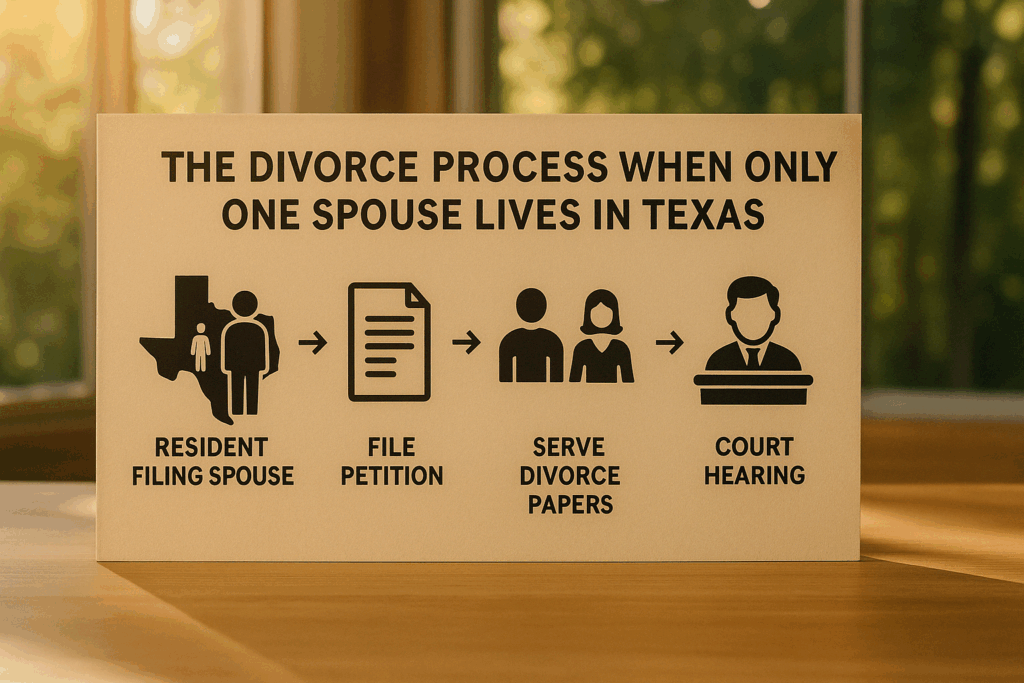
Let’s say you’re living your life in Texas—working, parenting, juggling the usual chaos—and suddenly, the thought hits you: Can You File for Divorce in Texas If Only You Live Here and your spouse is living somewhere else entirely? Maybe they moved away years ago, or maybe they never relocated here in the first place. Whatever the reason, you’re ready to move forward, but the logistics feel confusing. Here’s the short answer: yes, you can file for divorce in Texas if you’re the only one living here, as long as you’ve met the state’s residency requirements.
But of course, it’s never quite as simple as a “yes” or “no.” Divorce when one spouse is out of state involves more than just paperwork—it means navigating Texas residency laws, figuring out how to serve someone miles (or even continents) away, and making sure your kids, finances, and emotional well-being don’t get lost in the shuffle.
This blog unpacks everything you need to know about filing solo in Texas—from how judges handle custody and property division when one spouse isn’t local, to how divorce can affect your children’s school life and academic stability. We’ll share practical tips to help you keep your child’s education on track, reduce stress, and co-parent like a pro—even across state lines. Plus, you’ll see how working with a skilled Texas family law attorney from The Law Office of Bryan Fagan, PLLC can turn a complicated process into a clear path forward. So stick around. Whether you’re just starting to explore your options or ready to take action, we’re here to educate, support, and help you protect what matters most.
Texas Divorce Residency Requirements: Key Takeaways
- In Texas, one spouse must meet residency requirements of living in the state for six months and in the filing county for 90 days to file for divorce, even if the other spouse resides out of state.
- Jurisdiction is crucial in Texas divorce cases, as Texas courts require personal jurisdiction and a legal connection to the state for effective decision-making regarding property division and child custody.
- Proper serving of divorce papers and adherence to legal requirements is essential, particularly when the other spouse is out of state, to ensure a valid divorce process.
Understanding Texas Residency Requirements
Understanding the legal groundwork for filing divorce in Texas is essential—especially if your spouse doesn’t live in the state. So, Can You File for Divorce in Texas If Only You Live Here? The answer is yes, and the rules are clearly laid out in the Texas Family Code. Specifically, Section 6.301 of the Texas Family Code states that a suit for divorce may not be maintained unless either the petitioner or the respondent has been a domiciliary of Texas for at least six months and a resident of the county where the suit is filed for at least 90 days.
This provision ensures that Texas has a legitimate interest in adjudicating the divorce, even when only one party lives in the state. For residents navigating the challenges of long-distance marriage dissolution, this is empowering. It means that if your spouse moved away—or never lived in Texas at all—you can still proceed with divorce here, as long as you meet the residency benchmarks.
Special provisions also exist for military families under Texas law. Time spent out of state or overseas due to military service (or as the accompanying spouse of a service member) can still count toward establishing Texas residency. This flexibility, supported by Section 6.303 of the Texas Family Code, is particularly helpful for military couples who consider Texas their home base despite being stationed elsewhere.
As our family law team often advises, once residency is established, the process begins with filing an Original Petition for Divorce in the appropriate Texas county. From there, your case follows the standard legal timeline, including serving your spouse and addressing matters like property, custody, and support.
For a deeper dive into this topic, we encourage you to visit our in-depth guide: Can You File for Divorce in Texas If Only You Live Here? Here’s What You Need to Know. You can also explore how this topic relates to issues like serving divorce papers to an out-of-state spouse—a frequent concern for clients navigating cross-state separation. Our goal at The Law Office of Bryan Fagan, PLLC is to provide clarity, confidence, and support throughout your family law journey. When only one spouse lives in Texas, we help ensure the law still works in your favor.

Jurisdiction in Texas Divorce Cases
When only one spouse lives in Texas, understanding how jurisdiction works is crucial to determining whether the court can hear and rule on your divorce case. So, Can You File for Divorce in Texas If Only You Live Here? Yes, you can—but whether the Texas court can make binding decisions on property, support, or custody depends on jurisdiction. Under Texas Family Code Section 6.301, a Texas court can grant a divorce as long as one spouse has lived in Texas for at least six months and in the county of filing for at least 90 days.
However, residency alone doesn’t automatically give the court authority over every aspect of the case—particularly if the other spouse lives out of state. For the court to issue orders regarding property division, spousal maintenance, or child support, it must also have personal jurisdiction over the non-resident spouse. This is where the Texas Long-Arm Statute and Texas Rules of Civil Procedure Rule 120a come into play. If the out-of-state spouse has sufficient connections to Texas—such as owning property, conducting business, or having previously lived here—the court may still exercise jurisdiction over them.
If your spouse objects to the court’s jurisdiction, they may file a special appearance challenging it. This legal tool doesn’t waive their rights or submit them to the court’s authority—it simply contests the court’s power to decide certain matters in the case. As the attorneys at our firm know well, these jurisdictional disputes require precision and a deep understanding of both Texas law and interstate procedure.
For more information about how courts handle divorce when one spouse lives out of state, be sure to read this detailed resource, which outlines what to expect and how to prepare.
And if you’re also wondering how this affects matters like parenting arrangements, you may want to explore our post on child custody when parents live in different states—a topic that often goes hand-in-hand with jurisdiction concerns. At The Law Office of Bryan Fagan, PLLC, our team is dedicated to ensuring that even complex divorce cases involving long-distance spouses are handled with care, clarity, and a firm grasp of Texas family law. You don’t have to navigate these challenges alone.

Serving Divorce Papers to an Out-of-State Spouse
Serving divorce papers to an out-of-state spouse can be meticulous. Divorce papers must be served personally or through certified mail, ensuring proof of service is documented. After filing the original petition, the other spouse must be served with the documents, either directly or through a process server if necessary.
If personal service fails, alternative methods like substituted service can be employed, given there’s evidence of the spouse’s whereabouts. A Motion for Substituted Service must be filed if previous attempts at serving the spouse have failed. In cases where the spouse cannot be located, service by publication is permitted, but only after exhausting other means of locating them.
Proper service of divorce papers is essential to validate the process legally. Grasping these legal concepts and effectively serving a spouse outside Texas is vital for a smooth divorce process.
The Divorce Process When Only One Spouse Lives in Texas
When one spouse lives in Texas and the other resides out of state, the divorce must be filed in the Texas county where the resident spouse lives, in accordance with Texas Family Code Section 6.301. This section outlines the minimum residency requirement—six months in the state and 90 days in the county—to initiate the divorce process. If you’re wondering Can You File for Divorce in Texas If Only You Live Here, the answer is yes, as long as these residency benchmarks are met.
Once jurisdiction is established, the divorce process begins with the filing of the Original Petition for Divorce. The non-resident spouse must then be properly served with divorce papers, either through personal service or other court-approved methods. The case proceeds like any other Texas divorce, including opportunities for negotiation, mediation, or trial if agreements can’t be reached.
If the case goes to trial, both parties will present their evidence and testimony. The court will make final rulings on essential matters such as property division, conservatorship (custody), visitation, and spousal maintenance. These decisions are made with fairness in mind, based on the facts presented and within the bounds of the Texas Family Code—particularly Sections 7.001 (property division) and 153.002 (best interest of the child).
Once the trial concludes or a settlement is approved, the court will issue a final divorce decree. This legally ends the marriage and includes enforceable orders regarding parenting, finances, and division of assets. While this process can feel overwhelming—especially when spouses are in different states—knowing what to expect can ease stress and improve outcomes.
For insight into how living apart during the divorce process can affect emotional stability and legal logistics, we recommend reading this related article. And if you’re interested in how physical separation might impact parental rights or visitation schedules, our blog on navigating long-distance parenting plans in Texas offers practical advice. According to the attorneys at our firm, understanding each step of the divorce process when you’re the only spouse living in Texas is key to reducing anxiety and making informed choices. At The Law Office of Bryan Fagan, PLLC, we are committed to guiding you through this transition with the legal clarity and compassionate care you deserve.

Special Considerations for Child Custody and Support
Child custody and support become critical aspects of divorce, especially when children are involved. Child custody jurisdiction in Texas is governed by the Uniform Child Custody Jurisdiction and Enforcement Act (UCCJEA), which considers where the child has lived for the past six months. Under the UCCJEA, a Texas court can make a custody determination if Texas is the child’s home state.
For child support, Texas can exercise jurisdiction over a non-resident parent if they’ve lived with the child in Texas or provided financial support while residing there. These measures ensure the child’s financial needs are met, regardless of the non-resident parent’s location.
When immediate issues like child custody or spousal support arise, temporary court orders can address these matters before the final divorce decree. While these considerations add complexity to the divorce process, they ensure the child’s best interests are prioritized, and it may be necessary to divorce immediately in certain situations.
Dealing with Property Division Across State Lines
Property division becomes especially complex when spouses live in different states, but if you’re wondering Can You File for Divorce in Texas If Only You Live Here, the answer is yes—provided you meet Texas’s residency requirements under Texas Family Code Section 6.301. Once residency is established, the court can proceed with the divorce, including dividing property. Texas law follows community property principles, meaning that most assets acquired during the marriage are presumed to be owned equally by both spouses and must be divided in a manner that is “just and right” under Texas Family Code Section 7.001.
However, property acquired before the marriage, through inheritance, or as a gift is typically considered separate property under Section 3.001 and is not subject to division. The challenge arises in proving which assets are truly separate—especially when your spouse is out of state and less cooperative. Key cases like Cameron v. Cameron and Cockerham v. Cockerham have clarified that the burden of proving separate property is high and rests on the spouse making the claim.
When spouses live in different states, courts may also face limitations enforcing division over out-of-state property unless jurisdiction exists. In these scenarios, a knowledgeable Texas divorce attorney is essential. At our firm, we regularly help clients gather the documentation needed, identify property classifications, and resolve disputes—ensuring no asset is overlooked or unfairly divided. For more guidance, read this overview of Texas divorce laws. You may also find value in our related blog post on dividing property in a Texas divorce. The attorneys at The Law Office of Bryan Fagan, PLLC are committed to protecting your financial future while delivering clear, compassionate legal support throughout your divorce.

Practical Tips for Filing for Divorce in Texas
Filing for divorce in Texas successfully requires careful preparation and attention to detail. Start by gathering all necessary financial documents, including tax returns, pay stubs, and bank statements. This step provides a clear picture of your financial situation and ensures accurate information is presented to the court.
It’s crucial to avoid common mistakes such as incomplete forms or missing deadlines. Proper service of process must be conducted according to Texas rules, which include delivering divorce papers either in person or via certified mail. Following these steps correctly can significantly impact the proceedings.
These practical tips can help streamline the divorce process and avoid unnecessary complications by following some basic steps. Staying organized and proactive makes navigating the legal landscape much more manageable.
The Importance of Hiring a Skilled Texas Divorce Attorney
If you’re asking Can You File for Divorce in Texas If Only You Live Here, the answer is yes—but filing is just the first step. What comes next can be overwhelming without the right legal support. Whether you’re dealing with custody, property, or serving a spouse who lives in another state, hiring a skilled Texas divorce attorney can make all the difference. Under Texas Family Code Sections 6.301 and 153.002, your attorney ensures that not only are residency and filing requirements met, but that your child’s best interests and your rights are fully protected throughout the legal process.
According to the attorneys at our firm, one of the most important roles we play is helping clients avoid common pitfalls—like incomplete financial disclosures, missing procedural deadlines, or entering agreements that don’t align with long-term needs. We also help clients manage difficult negotiations involving custody schedules and division of assets, offering guidance grounded in both compassion and legal clarity. With the right legal partner, you’re not just reacting to divorce—you’re planning your next chapter.
Many of our clients have shared that having a responsive and empathetic attorney brought peace of mind during some of the most difficult moments in their lives. Knowing what to expect—and having someone in your corner to interpret the law and advocate for your interests—transforms uncertainty into a sense of control. From filing the initial petition to finalizing a decree, experienced counsel helps streamline the process and reduce emotional strain.
For those still considering whether divorce is the right path, we encourage exploring this article on living apart without divorcing. You may also find it helpful to read our blog post on the emotional impact of family law matters and how to prepare. Whether you’re ready to file or simply weighing your options, The Law Office of Bryan Fagan, PLLC is here to provide the legal insight and compassionate care you need to protect your future.

Real-Life Examples and Client Stories
Real-life examples and client stories can offer encouragement and guidance for those considering divorce under similar circumstances. One client shared that their uncontested divorce was made easy thanks to their attorney’s empathetic guidance, prompt answers, and consistent updates throughout the process.
Another couple highlighted that by working together amicably and with the help of their attorney, they and their husband achieved a fair division of assets, avoiding a complicated court battle, and they decided to wait rather than rush into decisions on land. They also made sure to sign all necessary documents to follow finalize the married agreement with consent.
These stories illustrate how support from attorneys and collaboration can make the divorce process smoother and more manageable.
Conclusion:
Filing for divorce when you’re the only one living in Texas can feel like you’re charting unknown territory—but you’re not alone, and you don’t have to guess your way through it. Whether you’re dealing with long-distance logistics, juggling parenting across two households, or trying to keep your child’s school life steady through the storm, having the right guidance can make all the difference.
At The Law Office of Bryan Fagan, PLLC, we’ve helped countless Texans just like you turn uncertainty into clarity. We’re here to make sure your rights are protected, your kids stay grounded, and your future doesn’t get lost in the paperwork. If you’re ready to take that first step—or even if you’re still weighing your options—we’re always just a conversation away.
And hey, if you’ve made it this far, you’re already showing the kind of care and commitment that bodes well for whatever comes next. So go ahead—ask the questions, get the facts, and let’s create a legal strategy that works for you and your family. Because your future—and your peace of mind—deserve nothing less.





